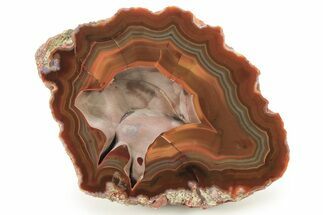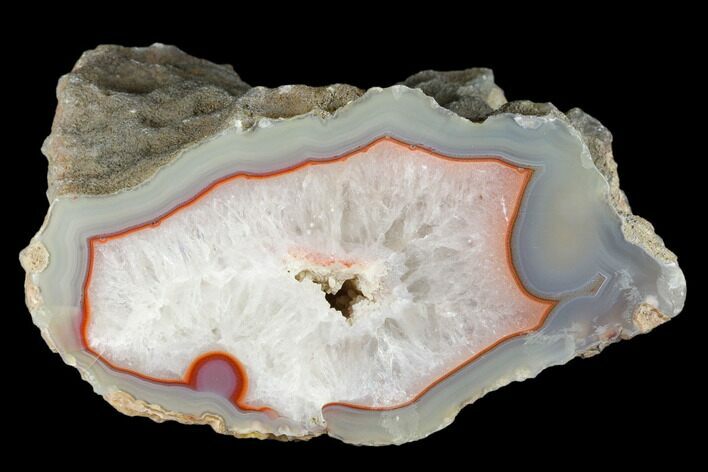This Specimen has been sold.
5.2" Polished Laguna Agate End Cut - Ojo Laguna, Mexico
This is a beautiful, 5.2" wide end cut of a Laguna agate nodule. It has been cut flat on one side and polished to a glossy finish, revealing the great red, purple and green hues.
Laguna agate is a highly sought after variety of banded chalcedony. It often forms in bands of red, pink, white, and scarlet hues, and some specimens even contain bands of brown and golden yellow chalcedony. The first documented finds of this agate occurred in the late 1940s: since then, these agates have been extracted from several sites near Ojo Laguna, Chihuahua, Mexico. They are roughly 38 million years old.
Like many other agates, Laguna agates form by deposition of microscopic silica crystals in concentric layers within cavities of rocks. The colors of the agate are dependent on impurities within the silica-rich solutions, of which are often supplied by the surrounding rock.
Like many other agates, Laguna agates form by deposition of microscopic silica crystals in concentric layers within cavities of rocks. The colors of the agate are dependent on impurities within the silica-rich solutions, of which are often supplied by the surrounding rock.
About Agate
Agate is a variety of microcrystalline quartz (chalcedony) that displays translucence and, in some cases, banding. Agate primarily forms when silica-rich fluids fill pockets within rocks and/or fossils, depositing the silica along the walls of the rock. This process can result in banding patterns, as the compositions and impurities of these depositing fluids change over time. These banding patterns can either form as flat layers, creating linear patterns known as waterline agate, or as rounded layers, forming more common ring-like patterns. These patterns depend on the surfaces available for deposition.
Agate is a variety of microcrystalline quartz (chalcedony) that displays translucence and, in some cases, banding. Agate primarily forms when silica-rich fluids fill pockets within rocks and/or fossils, depositing the silica along the walls of the rock. This process can result in banding patterns, as the compositions and impurities of these depositing fluids change over time. These banding patterns can either form as flat layers, creating linear patterns known as waterline agate, or as rounded layers, forming more common ring-like patterns. These patterns depend on the surfaces available for deposition.
SPECIES
Chalcedony var. Agate & Quartz
LOCATION
Ojo Laguna, Chihuahua, Mexico
SIZE
5.2 x 2.8", up to 4.2" thick
CATEGORY
SUB CATEGORY
ITEM
#180601
 Reviews
Reviews














